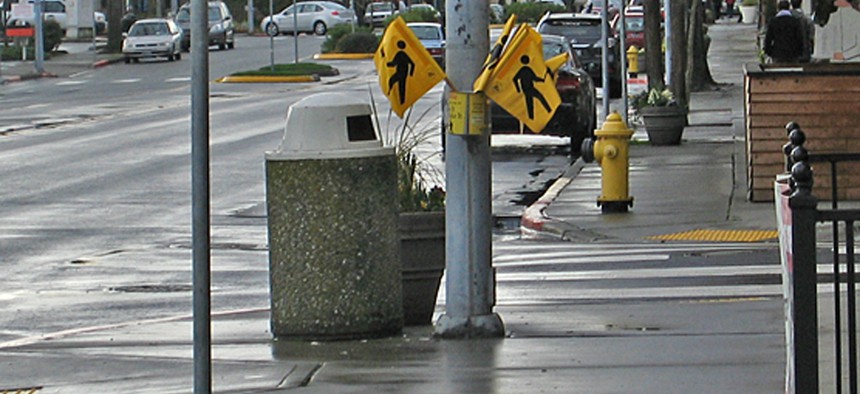Connecting state and local government leaders
More cities are trying to make crossing the street less deadly by handing out low-tech flags. But does this just make walkers seem weird?
Florida is a lousy place to walk. Life-threatening, even. Four of the 10 metro areas where pedestrians are most likely to be killed by drivers are in the Sunshine State, according to rankings released earlier this year by Smart Growth America and the National Complete Streets Coalition.
Fort Lauderdale was one of the cities on that miserable list, and city leaders have said they are committed to improving conditions for people on foot using a number of strategies. One of which is asking them to carry an orange flagwhen crossing a particularly busy boulevard in the heart of the city.
Fort Lauderdale officials say that they’re putting out the bright orange flags as just one part of a vision of the city’s transportation future [PDF] in which “the pedestrian is first.” They’ve got a long way to go. During a 2012 telephone town meeting, only 10 percent of Fort Lauderdale residents said the city was “very pedestrian friendly,” while 54 percent said it “needs lots of improvement.” Sixty percent of respondents to a survey said they thought more bikeable and walkable streets should be among the city’s top priorities for capital investment.
But are flags the right way to do that? What message are they really sending?
Pedestrian flags, with their relatively cheap, low-tech appeal, are nothing new. They are reportedly common in Japan, especially around schools. They’ve been deployed by neighborhood activists trying to improve street safety in Hawaii. Kirkland, Washington, has had a flag program since the mid-1990s, which a study found to be “moderately effective.” [PDF]
Berkeley and Seattle both tried the flags, too, before giving them up as a waste of resources. According to Berkeley’s study of the program, “the use of the flags did not have a noticeable effect upon driver behavior,” and many flags were stolen, leading to high replacement costs. (Also, this being Berkeley, “Many of those who picked up the flags used them for purposes other than for which they were intended.”)
Still, people keep trying it. Bridgeport, Connecticut, has a pilot flag program going on. In St. Paul, Minnesota, Macalester College introduced flags near campus recently after two students were hit and severely injured in a crosswalk in May. One car had stopped for them, but another drove through the crossing, critically injuring one of the students.
Those flags are part of a multipronged effort to improve drivers' awareness of the Minnesota law that requires them to stop for people crossing. "You still have to be cautious, but the flags give you one more tool,” a Macalester employee told the Pioneer Press. “Some drivers look at you like you're a lunatic and they blow by you, but the majority of the people stop."
Of course, it only takes one person “blowing by” to kill you.
A recent study of driver behavior in Chicago highlights just how difficult it is to change driver behavior—and offers some insight into strategies that actually work. For four years, Illinois has had a law requiring motorists to stop at a painted crosswalk to let pedestrians cross. But according to an observational study conducted by the advocacy group Active Transportation Alliance, only 18 percent of drivers on average stopped for people on foot in a marked crosswalk.
What’s more, the street designs that proved effective in Chicago and its suburbs don’t require pedestrians to do something that many might feel is silly—like carrying a flag. They don’t make it seem like crossing the street is an unusual or eccentric thing to do. They weave the protections for the pedestrians into the fabric of the street itself.
Part of the reason drivers in so many parts of the country treat people on foot as if they were invisible is that the streets are designed to keep traffic moving, funneling through the maximum number of cars in the minimum amount of time. More visible crosswalks and other visual cues can help with that part.
But another very important factor is that many people in this country don’t walk very much themselves. They don’t project themselves in the pedestrian’s frame of mind when they’re driving, because they are rarely in the pedestrian’s position at any other time.
In many communities, people traveling by foot are often stigmatized as poor or mentally ill. Expecting people to carry flags so they can cross without getting killed—in the words of Kirkland’s campaign, expecting them to “Take It to Make It”—only increases the sense that being a person on foot is somehow weird or embarrassing. Cities should instead be doing everything they can to advance the radical notion that walking is a perfectly normal thing to do.



